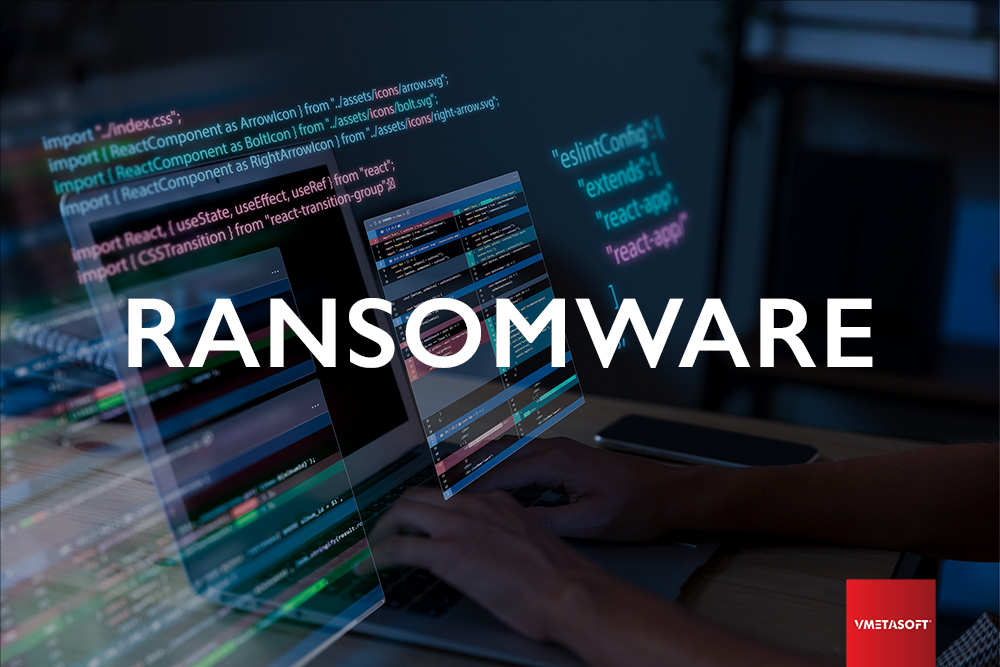Rising Ransomware Threat: How Vmetasoft is handing the Attack to Protect its Clients
In recent years, the world has witnessed a dramatic rise in ransomware attacks, with cybercriminals exploiting vulnerabilities in computer systems and wreaking havoc on individuals, businesses, and even government organizations. These attacks have the potential to cause severe financial losses, data breaches, and disruption of critical services. In this blog post, we will delve into the nature of ransomware attacks, their implications, and explore effective solutions to combat this ever-evolving menace.
Understanding Ransomware Attacks
Ransomware is a type of malicious software designed to encrypt data on a victim’s computer or network, rendering it inaccessible until a ransom is paid to the attackers. It often infiltrates systems through deceptive emails, infected websites, or vulnerabilities in software. Once the ransomware is activated, it swiftly spreads across the network, encrypting files and locking users out of their data. The attackers then demand payment, usually in cryptocurrency, in exchange for providing the decryption key.
Implications of Ransomware Attacks
The consequences of a successful ransomware attack can be far-reaching and devastating:
- Financial Losses: Businesses can suffer significant financial losses due to downtime, operational disruptions, and potential legal liabilities associated with compromised customer data.
- Data Breaches: Ransomware attacks often involve data exfiltration, whereby sensitive information is stolen before encryption. This can lead to data breaches, loss of intellectual property, and compromised customer trust.
- Reputation Damage: Organizations affected by ransomware attacks may experience reputational damage, leading to a loss of customer confidence and potential business decline.
- Operational Disruption: Ransomware attacks can cripple critical systems, disrupting day-to-day operations and affecting essential services, such as healthcare, transportation, and public utilities.
Combatting Ransomware Attacks
While ransomware attacks pose a significant threat, Vmetasoft has a proactive strategies that helps organizations protect themselves against this menace:
- Regular Backups: Regularly back up important data and store it offline or in a secure, isolated network. This ensures the ability to restore critical systems and files without paying the ransom.
- Employee Education: Provide comprehensive cybersecurity training to all employees, emphasizing the importance of recognizing suspicious emails, avoiding malicious websites, and practicing safe browsing habits.
- Robust Security Measures: Implement multi-layered security measures, including firewalls, intrusion detection systems, and antivirus software. Regularly update and patch all software and operating systems to address vulnerabilities.
- Access Control: Restrict user privileges and implement the principle of least privilege. Limiting user access to sensitive data minimizes the impact of a potential breach.
- Incident Response Plan: Develop an incident response plan that outlines the steps to be taken in the event of a ransomware attack. This plan should include processes for isolating infected systems, notifying relevant authorities, and engaging cybersecurity experts for recovery.
- Security Audits: Conduct regular security audits and vulnerability assessments to identify potential weaknesses in systems and address them promptly.
- Network Segmentation: Segmenting networks into separate, isolated zones with restricted access can limit the lateral movement of ransomware within an organization’s infrastructure.
- Cyber Insurance: Consider obtaining cyber insurance coverage that can help mitigate financial losses and facilitate the recovery process in the event of a successful ransomware attack.
Conclusion
Ransomware attacks continue to be a significant and evolving threat in today’s digital landscape. Organizations must remain vigilant, adopt robust cybersecurity practices, and stay up to date with the latest trends and countermeasures. By implementing preventive measures, educating employees, and developing comprehensive incident response plans, businesses can enhance their resilience and mitigate the impact of ransomware attacks. Collaboration between government entities, law enforcement agencies, and cybersecurity professionals is crucial in the ongoing fight against this persistent menace. Together, we can combat ransomware and safeguard our digital future.
Let us know how we can help you to prevent such malicious attack.
Tags In
- Agriculture
- Artificial Intelligence
- Big Data
- Business Process Improvement
- Business Process Re-engineering
- Cloud Computing
- CRM software
- Cyber Security
- Data Mining
- Data science
- Data Storage Technology
- DataBase
- DevOps Environment
- Digital Transformation
- ERP Software
- Fraud Prevention
- How to Solve
- IoT: Internet of Things
- Java
- Logo Design
- Product Development
- Uncategorized
- Ux Design
- Virtual Reality Technology
- Web Development
- Work Culture
ANN artificial intelligence Artificial Neural Network asset management attack branding buisness buisness development buisness software buisness technology cloud computing CRM Software database data mining digital transformation ERP Software generative ai growth rate how to hr human capital management software hybrid iass India inventory management java progamming language logo design machine learning microsoft edge modernization mtbf mttr pass performance prevention private public ransomware red hat enterprise linux sass smart manufacturing soc SSD training and deployment unistall
Recent Comments
Thank You
Thank you Zen
Thank you Cerebrozen
Really a insightful bog
We really apprecite Vmetasoft affort, helping our brand with SOC. We are really proud to be partnered with Vmetasoft Inc.





